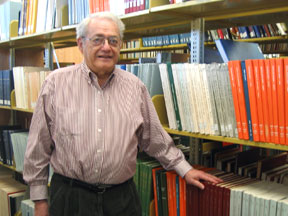#3) Michael Krauss: Founder of the Alaska Native Language Center
 Click here to listen to the audio. Story length: 4:02 minutes. File size: 2.78 MB.
Click here to listen to the audio. Story length: 4:02 minutes. File size: 2.78 MB.  Narrator: Welcome to "History at Risk: Linking Alaskans to their Past". The Native languages spoken in Alaska are an intimate part of people's lives and integral to their cultural understanding of the world. Anyone who sets out to become fluent in a foreign language knows they must also learn a new culture. Michael Krauss founded the Alaska Native Language Center at the University of Alaska-Fairbanks. His passion for languages and their preservation began as a schoolboy.
Narrator: Welcome to "History at Risk: Linking Alaskans to their Past". The Native languages spoken in Alaska are an intimate part of people's lives and integral to their cultural understanding of the world. Anyone who sets out to become fluent in a foreign language knows they must also learn a new culture. Michael Krauss founded the Alaska Native Language Center at the University of Alaska-Fairbanks. His passion for languages and their preservation began as a schoolboy.Krauss: “I just remember being late for school one morning because some men were building something on a road along the way and I stopped absolutely fascinated by the interesting way they were talking in some foreign language- maybe Polish or Hungarian. Under the pretence of being interested in the construction, I stood there listening for the longest while, which made me late for school. And I guess that was the first obvious manifestation of a trait that definitely explains my whole career, namely a very abiding interest in minority and underdog languages as opposed to learning Russian at that time,
or some other expansive language.”
Narrator: Krauss did not study Alaska Native Languages until after he came to the university in Fairbanks. He was a Carnegie visiting Professor of Linguistics and two undergraduate students changed the course of his career and life.
Krauss: “Martha Teelock, a Yup’ik from the Yukon Delta and Irene Reed, a third generation Finnish American who grew up bilingual speaking Finnish as well as English. In the spring of 1961, they sort of ganged up on me to give a course in Eskimo. There were six students in that class where Martha was the main source of information, Irene was the very diligent student of Yup’ik, and I was the MC.”
Narrator: That spring, Krauss wrote a National Science Foundation proposal to survey Alaska Native Languages, their status, and their viability. The funding allowed Krauss to support Reed, Teelock and others to make field recordings, and to transcribe texts, grammars and vocabularies. This was the beginning of the research program on Alaska Native Languages at the University, and was the prelude to major legislation that would support native language and culture.
Krauss: “’67-68 was the year of the passage and enactment of the Title 7 First Bilingual Bills in federal educational law and policy, which made it at least allowable finally to teach in languages other than English for students, who didn’t speak or understand English on the grounds that it was giving them an equal opportunity in education. And in ‘69, a course called Eskimo Language Workshop, was first given for advanced students in Yup’ik to hone their skills in writing the language. All of this was a kind of underground movement to allow the use of Alaska Native languages in Alaska schools.”
Narrator: In 1972, Alaska State Legislature passed the Bilingual-Bicultural Act. It was a twin bill mandating for native language education in villages with at least eight children whose primary language was not English, and establishing the Alaska Native Language Center. Thirty-three years later, the Alaska Native Language Center continues to document and preserve native languages with Michael Krauss still a passionate advocate.
Narrator: Funding was provided by the University of Alaska President's Special Projects Fund. From the University of Alaska Fairbanks Oral History Program, this is Bill Schneider.